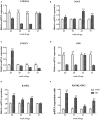Dietary Soybean Oil Supplementation Affects Keel Bone Characters and Daily Feed Intake but Not Egg Production and Quality in Laying Hens Housed in Furnished Cages
- PMID: 33816591
- PMCID: PMC8017272
- DOI: 10.3389/fvets.2021.657585
Dietary Soybean Oil Supplementation Affects Keel Bone Characters and Daily Feed Intake but Not Egg Production and Quality in Laying Hens Housed in Furnished Cages
Abstract
To evaluate dietary soybean oil supplementation on production performance, egg quality, and keel bone health in laying hens. Two hundred and four laying hens at 20 weeks of age (WOA) were distributed into 12 cages containing 17 birds each. Birds were either fed a commercial diet (control group, CON) or a diet supplemented with 3% of soybean oil (SO group). Experiments lasted 17 weeks. Body weight, daily feed intake, production performance and egg quality were measured at 25, 29, 33, and 37 WOA. Birds were subsequently assessed for keel bone status by palpation, and keel was excised to measure bone length, microstructure, bone mineral density (BMD), elements contents, and the expression of osteoprotegerin (OPG), receptor activator of nuclear factor kappa-B ligand (RANKL), collagen type II alpha 1 (COL2α1), periostin (POSTN), and sclerostin (SOST). The results showed that dietary SO supplementation did not affect production performance and egg quality (P > 0.05), but improved body weight of hens at 29 and 37 WOA (P < 0.05), and decreased daily feed intake at 33 and 37 WOA (P < 0.05). Incidence of keel bone damage (especially fracture) was higher in hens of SO group. Keel bone length in birds of SO group was significantly decreased compared to CON (P < 0.05). Keel bone of supplemented hens showed increased trabecular separation at 29 WOA and higher levels of V, Mn, Fe, Se, and Ba at 33 WOA (P < 0.05). Moreover, decreased BMD, trabecular number and thickness were observed in keel bone of laying hens receiving supplementation at 29 and 37 WOA (P < 0.05); decreased levels of Li, Ca, Hg, and TI at 33 WOA and trabecular thickness at 37 WOA (P < 0.05) were also identified. mRNA levels of SOST and RANKL and the ratio of RANKL/OPG mRNA levels were increased in birds fed a SO-supplemented diet (P < 0.05); COL2α1, OPG, and POSTN were downregulated at all sampling points (P < 0.05). Taken together, results indicate that feeding laying hens a diet supplemented with soybean oil can decrease daily feed intake and impair keel bone health but not influence production performance and egg quality.
Keywords: diet; keel bone health; laying hen; production performance; soybean oil.
Copyright © 2021 Wei, Pan, Li, Zhao, Li, Zhang and Bao.
Conflict of interest statement
The authors declare that the research was conducted in the absence of any commercial or financial relationships that could be construed as a potential conflict of interest.
Figures


Similar articles
-
Low dietary phosphorus impairs keel bone health and quality in laying hens.Br Poult Sci. 2022 Feb;63(1):73-81. doi: 10.1080/00071668.2021.1960951. Epub 2021 Aug 17. Br Poult Sci. 2022. PMID: 34309436
-
Keel fracture changed the behavior and reduced the welfare, production performance, and egg quality in laying hens housed individually in furnished cages.Poult Sci. 2020 Jul;99(7):3334-3342. doi: 10.1016/j.psj.2020.04.001. Epub 2020 Apr 24. Poult Sci. 2020. PMID: 32616227 Free PMC article.
-
Abnormal Bone Metabolism May Be a Primary Causative Factor of Keel Bone Fractures in Laying Hens.Animals (Basel). 2021 Nov 2;11(11):3133. doi: 10.3390/ani11113133. Animals (Basel). 2021. PMID: 34827866 Free PMC article.
-
The Influence of Keel Bone Damage on Welfare of Laying Hens.Front Vet Sci. 2018 Feb 28;5:6. doi: 10.3389/fvets.2018.00006. eCollection 2018. Front Vet Sci. 2018. PMID: 29541640 Free PMC article. Review.
-
Explanations for keel bone fractures in laying hens: are there explanations in addition to elevated egg production?Poult Sci. 2020 Sep;99(9):4183-4194. doi: 10.1016/j.psj.2020.05.035. Epub 2020 Jun 24. Poult Sci. 2020. PMID: 32867962 Free PMC article. Review.
Cited by
-
Keel bone damage affects behavioral and physiological responses related to stress and fear in two strains of laying hens.J Anim Sci. 2022 Apr 1;100(4):skac076. doi: 10.1093/jas/skac076. J Anim Sci. 2022. PMID: 35275597 Free PMC article.
-
Fermented calcium butyrate supplementation in post-peak laying hens improved ovarian function and tibia quality through the "gut-bone" axis.Anim Nutr. 2024 Jan 3;16:350-362. doi: 10.1016/j.aninu.2023.10.008. eCollection 2024 Mar. Anim Nutr. 2024. PMID: 38362518 Free PMC article.
-
Combination of Cinnamaldehyde with Carvacrol or Thymol Improves the Mechanical Properties of Tibia in Post-Peak Laying Hens.Animals (Basel). 2022 Nov 10;12(22):3108. doi: 10.3390/ani12223108. Animals (Basel). 2022. PMID: 36428337 Free PMC article.
-
Effects of Oil Types and Fat Concentrations on Production Performance, Egg Quality, and Antioxidant Capacity of Laying Hens.Animals (Basel). 2022 Jan 27;12(3):315. doi: 10.3390/ani12030315. Animals (Basel). 2022. PMID: 35158638 Free PMC article.
References
-
- Baião NC, Lara LJC. Oil and fat in broiler nutrition. Rev Bras Cienc Avic. (2005) 7:129–41. 10.1590/S1516-635X2005000300001 - DOI
-
- Dänicke S, Halle I, Jeroch H, Böttcher W, Ahrens P, Zachmann R, et al. . Effect of soy oil supplementation and protein level in laying hen diets on praecaecal nutrient digestibility, performance, reproductive performance, fatty acid composition of yolk fat, and on other egg quality parameters. Eur J Lipid Sci Technol. (2000) 102:218–32. 10.1002/(SICI)1438-9312(200003)102:3<218::AID-EJLT218>3.0.CO;2-F - DOI
-
- Küçükersan K, Yeşilbag D, Küçükersan S. Influence of different dietary oil sources on performance and cholesterol content of egg yolk in laying hens. J Biol Environ Sci. (2010) 4:117–22. Available online at: http://jbes.uludag.edu.tr/PDFDOSYALAR/12/mak03.pdf
-
- Lelis GR, da Silva MD, Tavernari FDC, Albino LFT, Rostagno HS. Performance of layers fed diets containing different oils. Rev Bras Cienc Avic. (2009) 11:235–40. 10.1590/S1516-635X2009000400004 - DOI
LinkOut - more resources
Full Text Sources
Other Literature Sources
Miscellaneous

